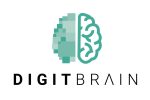This is possible, thanks to the funding provided by the DigitBrain project. Digitbrain is an EU-funded project which counts with a budget to run its own open calls.
Digitbrain belongs to the so called cascade funding schemes we introduced in our earlier post.
About DigitBrain
Digitbrain is a Horizon Europe Project whose vision is enabling SMEs and midcaps to benefit from digital twins in industrial environments. Quoting the official website of the project “The ambition of the DIGITbrain project is centred around two areas that will enable innovative use cases. On the one hand, the project realises an ambitious technological vision by developing the Digital Brain concept and its enabling technologies. On the other hand, it assures that these technological advances are taken up by a critical mass in the manufacturing sector, especially by SMEs and mid-caps, resulting in the smart business model Manufacturing as a Service, facilitated by a network of interconnected Digital Innovation Hubs (DIHs).”
Digitbrain open call, in a nutshell
Experiments are expected to model behaviour of an Industrial Product (manufacturing machine, line or mechatronic system) with the means of a Digital Twin. Besides, experiments are expected to demonstrate benefits in different phases of the life cycle of the Industrial Product, its adaption and/or evolution to new generations of the industrial product. Experiments are expecting to consider also environmental impacts.
Details about the open call
Consortium
At least 2 partners maximum 3. One of the partners should be an industrial player, the other one an ICT provider (company, research center, etc). The size of the companies is NOT restricted to SMEs as Midcaps are also eligible, which is a positive aspect, considering especially industrial players
Proposal
The proposal consists of an online form at Funding Box with 4 main sections:
- Experiment general info: Basic information about the project
- About Experiment partners: The Consortium itself including some financials to check size of companies applying.
- Experiment proposal: uploaded via PDF including 10 pages maximum plus the cover page.
- Ethics form: standard table. Similar to Horizon proposals.
Submission
Funding
7 experiments will be selected. Each receiving a maximum of 97.800€ equity free. This basically means we are talking of an open call with a global budget of 684.600€. Funding is not on a 100% rate for companies. On every euro spent in the project, the company receives 70cts as a grant. The rest is co-funded by the company. Non-profit organisations are funded on a 100% though.
A partner cannot get more than 60.000€, which in practical teams you need to do a minimum division of an approx. 60-40 division of the funding among partners if you are running a project of two. There are limitations if the partners have been already funded by other related initiatives in the context of the L4MS or SAE initiatives. A partner cannot receive more than 100.000€ among all projects belonging to those initiatives.
Calendar and Payments
The official procedure says the following:
- Submission on 31st May 2022
- Evaluation and contract signature till 30th September 2022 (+120 days)
- Execution if funded from October 2022 to September 2023 (1 year).
Payments are scheduled as follows:
- 25% in October 2022
- 45% in March 2023
- 30% in November 2023
Overall conclussions and important elements
This is a wonderful opportunity for factories in their digitisation process. The funding is interesting and schedule probably a bit long in time (1 year for a digital twin of a process is a very long time).
There is not a list of earlier funded parties in I4MS or SAE and this needs to be checked with potential partners.
It is a wise move to include mid-caps, as factories do many times belong to larger groups, which make them not being a SME as defined by the EC, but operate as one in practical terms.
IMPORTANT: Digitbrain counts with its own tech-stack which needs to be checked to use it as part of the technical solutions. This might be restrictive in terms of choosing the preferred architecture by the ICT partner and some research needs to be done before writing the proposal about it.
Participants need to check with their “pre-assigned” Digital Innovation Hub before submission. It is not very clear what is the expected support at proposal stage which can be received by the DIH. Seems to be used as a prior validation check of proposals, which is interesting.
Earlier funded experiments
If you need assistance in the proposal writing preparation, finding the right partners for the call or even having a double-check on what you are currently preparing, do not hesitate to contact us
If you are, on the other hand, managing a cascade grant and want us to promote your call and do a review of this nature, feel free to contact, we can definitely address the topic and help with dissemination within our networks.
